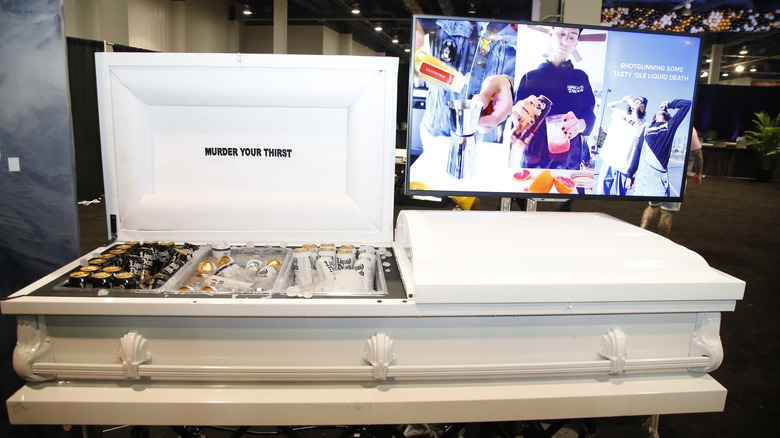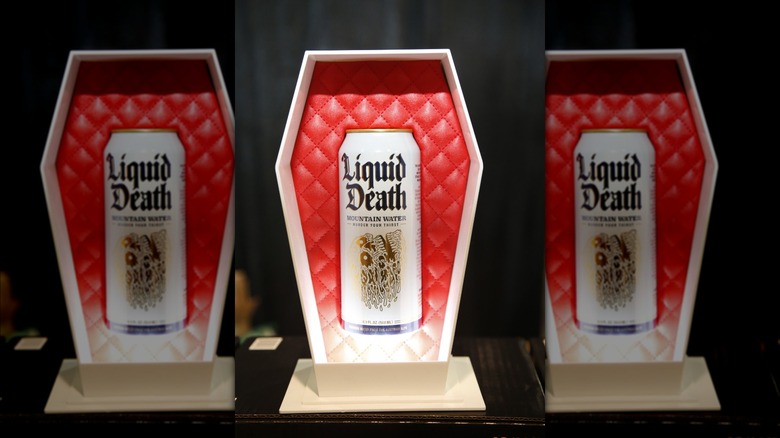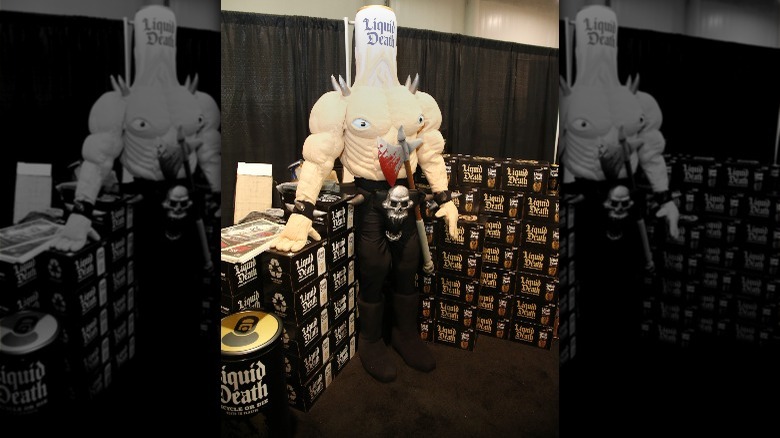How Liquid Death Became A Mainstream Success
Do you find water dull? It's obviously healthy and essential, but conventional wisdom would tell us it's the blandest, most neutral beverage there is. Yet, one look at the Hydro Homies on Reddit shows us that social-media-savvy millennials and zoomers can unironically appreciate the stuff. Not all water is the same, though, and neither are the containers it comes in.
Take bottled water, for example. Bottled drinks date back over a century, per National Geographic, originally filling the forms of glass and steel before switching over to aluminum cans. Then, in the '70s, a plastic that wouldn't taint its liquid contents with chemicals finally emerged, and the plastic water bottle was born. It was easy to carry, safe to drink from, and even recyclable, but the perception of bottled water quickly changed. Plastic water bottles are now widely associated with waste and pollution. Some are trying to ensure the containers become as efficiently and frequently recycled as possible, but others are simply swearing off the stuff.
Could canned water be the replacement for bottled water once more? Again, "canned water" doesn't sound too exciting at first glance, but perhaps there's a way to make it more appealing. La Croix does so with flavors and carbonation. Then, there's also Beaver Water, which seeks to simultaneously empower women and have fun with the double entendre implied by its name, per Adweek. In a somewhat similar marketing vein, there's also the fatal-sounding Liquid Death. Now that's impactful!
What is Liquid Death?
Don't worry, this drink won't actually kill you. Liquid Death and its canned water is here instead to "murder your thirst" with purified mineral water from deep underground. Liquid Death offers plain old Mountain Water and Sparkling Water plus flavored varieties like Berry It Alive, Mango Chainsaw, and Severed Lime. The company also wants to bring "death to plastic," purporting that unlike plastic — which mostly ends up in landfills due to the price associated with recycling it — aluminum is endlessly recyclable. It's a bold claim, but the business has got some stats (75% of all aluminum made since 1888 is still in use) and an even bolder name to match. The venture also puts its money where its mouth is by giving some of its profits to eco-friendly nonprofit organizations.
Where did such an idea come from? Per Los Angeles Magazine, the founder, Mike Cessario, is an art-college graduate with experience at L.A. ad agencies. He had also once been a heavy metal and punk rock musician. As such, in the 2010s, he recognized there was untapped potential for canned water to be marketed at nonconformists in the same edgy way as energy drinks and craft beers. So, Cessario came up with the most ridiculous name he could imagine — as reported by CNBC – and then searched for investors. Unfortunately, they weren't buying it. Cessario was informed no retailer would stock something with the word "death" in its title. They were dead wrong.
Liquid Death went viral
Mike Cessario's canned water brand is modern in more ways than one. After making a 3D rendering of his imagined product and shooting a low-budget commercial, Cessario tried to pass off Liquid Death as a finished product on Facebook (via CNBC). The video racked up millions of views, and the page surpassed Aquafina in Facebook followers. Commenters yearned to try Liquid Death, and real distributors tried to order a product that didn't even exist yet. That got investors on board.
According to Eater, when Liquid Death launched in 2019, bars, liquor stores, and tattoo parlors first eagerly sold the stuff, then concert promoters and music festivals joined in, too. Thus, artists, partiers, and skaters sampled it. By the 2020s, even mainstream retailers like 7-Eleven, Sam's Club, and Whole Foods were selling Liquid Death, and so, less-than-hip people like soccer moms got in on the fun, as well.
There are also Liquid Death detractors, however. Some claim that it's gimmicky, laughable, or toxically masculine. The fact that Liquid Death sells merch like candles, koozies, rings, shirts, and watches sort of supports the idea that the brand is mostly a marketing stunt. Similarly, its Timewaster 5000 webpage features celebrity cameos from the likes of Steve-O, Tony Hawk, and Wiz Khalifa. Still, it's hard to argue with a venture making over a hundred million dollars in annual sales! "At the end of the day," Cessario admitted to CNBC, "we're really creating an entertainment company and a water company."


